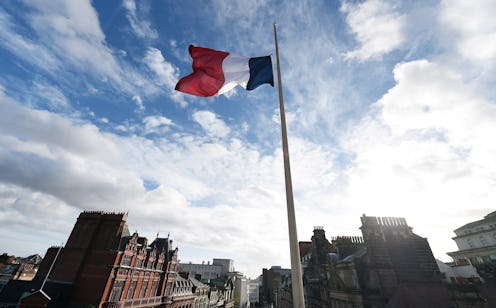In the aftermath of the terrorist attacks in Paris, artists around the world are inspiring solidarity with the city among nations worldwide through illustrations, showing us the expressive poignancy of art in times of tragedy. The images — which, in some cases, send a message more aptly and coherently than words — are flooding Facebook and Twitter news feeds and being published in newspapers. Surpassing the language barrier, they give people from all cultures a chance to stand together behind a common sentiment. A deep sympathy for the victims underlies each image, but most feature at the forefront a sense of determination to put a stop to the atrocities.
In response to these attacks, for example, many artists are posting politically-driven cartoons that support Paris and gently remind the world that non-Western nations are also being affected, regardless of the degree of media attention they receive. Some Arabic cartoons coincide with the popularization of #NotInMyName, a hashtag used by Muslims to highlight their disapproval of ISIS’s violent ideology and its sharp divergence from the tenets of Islam.
The cartoonists are among many who have shown support for France, but are wondering when the world will stand in solidarity with countries such as Beirut and Iraq, which were also attacked by ISIS on Friday. Egypt, for example, projected images of the Egyptian, French, Lebanese, and Russian flags onto the pyramids for two nights. Gamel, an Egyptian perfume shop owner, spoke to The Daily Beast about his point of view:
We are kind people. We are against terrorism. Unfortunately inside or outside of Egypt, an Egyptian carries no importance like a Westerner … Egypt wants to prove that something like that can happen anywhere in the world, but there should be sympathy wherever tragedy happens.
Similarly to Egypt’s display, these cartoons intend to further awareness of the double standard Arab nations witness each time they are forgotten by American mainstream media. But the cartoons have an advantage in this case — they are politically charged.
In this cartoon, the man with the broken finger represents Paris, and the patient on the far right, who is completely debilitated and receiving little attention, represents Syria and other non-Western nations that are relatively neglected.
Arab-Brazilian cartoonist Carlos Latuff depicts French President Hollande's reactionary attacks on Syria, whose innocent civilians experience the turmoil caused by air raids.
Despite the media's double standard, cartoonists remain by Paris' side. This cartoon, drawn by Jordanian artist Osama Hajjaj, expresses deepest sympathies for the French capital.
Paris is a city of light, being penetrated by a darkness that is ISIS.
Public Radio International and The Guardian compiled online galleries of illustrations by artists around the world. Spanish cartoonist Jaume Capedevila, aka Kap, delivers both sorrow and a strong sense of nationality through his cartoons by depicting France as a nation of resilience.
Swedish illustrator Linda Mill sends "amour" from Scandinavia.
A sketch by French artists Hélène Desputeaux and Michel Aubin addresses the inevitable sense of desperation.
Argentinian artist Cristian Dzwonik pays homage to Paris, and encourages peace beyond its borders.
As they say, a picture is worth a thousand words. British artist Jean Jullien shows us that a simple logo can, too.
Similarly to the Arab cartoonists, Phillippino illustrator Jerameel Lu lets the social media world know that these atrocities are happening in other countries besides France, and that the world must support them equally.
